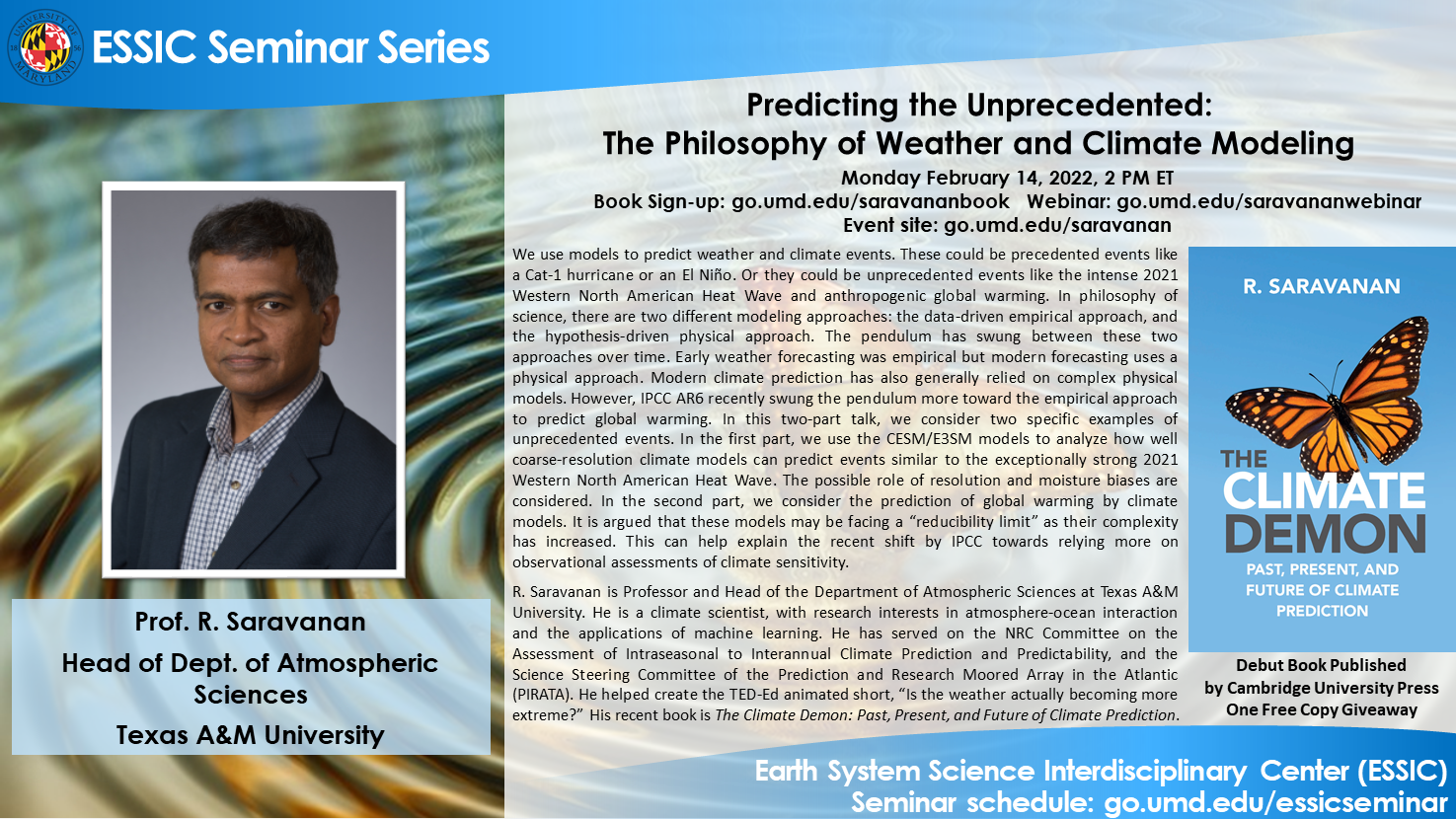
Predicting the Unprecedented: The Philosophy of Weather and Climate Modeling
This event has passed. View the seminar recording here:

Prof. R. Saravanan
Dept. of Atmospheric Sciences
Texas A&M University
Monday February 14, 2022, 2 PM ET
Abstract:
We use models to predict weather and climate events. These could be precedented events like a Cat-1 hurricane or an El Niño. Or they could be unprecedented events like the intense 2021 Western North American Heat Wave and anthropogenic global warming. In philosophy of science, there are two different modeling approaches: the data-driven empirical approach, and the hypothesis-driven physical approach. The empirical approach can handle precedented events well, but may fail to predict unprecedented events if they are “out of sample”. The physical approach is better suited to predicting unprecedented events, but only if we have accurate knowledge of the governing equations. The pendulum has swung between these two approaches over time. Early weather forecasting was empirical but modern forecasting uses a physical approach. Modern climate prediction has also generally relied on complex physical models. However, IPCC AR6 recently swung the pendulum more toward the empirical approach to predict global warming.
In this two-part talk, we consider two specific examples of unprecedented events. In the first part, we use the CESM/E3SM models to analyze how well coarse-resolution climate models can predict events similar to the exceptionally strong 2021 Western North American Heat Wave. The possible role of resolution and moisture biases are considered. In the second part, we consider the prediction of global warming by climate models. It is argued that these models may be facing a “reducibility limit” as their complexity has increased. This can help explain the recent shift by IPCC towards relying more on observational assessments of climate sensitivity.
Biosketch:
Saravanan is Professor and Head of the Department of Atmospheric Sciences at Texas A&M University. He is a climate scientist, with research interests in atmosphere-ocean interaction and the applications of machine learning. He has served on the NRC Committee on the Assessment of Intraseasonal to Interannual Climate Prediction and Predictability, and the Science Steering Committee of the Prediction and Research Moored Array in the Atlantic (PIRATA). He helped create the TED-Ed animated short, “Is the weather actually becoming more extreme?” His recent book is The Climate Demon: Past, Present, and Future of Climate Prediction.
The new book debut and one free copy giveaway
We are excited to welcome Prof. Saravanan as he debuts a new book, “The Climate Demon: Past, Present, and Future of Climate Prediction”, recently published by the Cambridge University Press. To be eligible, you need to sign up to the giveaway using the link below and attend the live webinar. To sign up and read the other specifications required to win, visit: https://go.umd.edu/saravananbook
The Climate Demon discusses climate predictions – and the computer models behind them – that play a key role in shaping public opinion and our response to the climate crisis. Some people interpret these predictions as ‘prophecies of doom’ and some others dismiss them as mere speculation, but the vast majority are only vaguely aware of the science behind them. This book gives a balanced view of the strengths and limitations of climate modeling, while exploring its philosophical foundations. It covers historical developments, current challenges, and future trends in the field. The accessible discussion of climate modeling only requires a basic knowledge of science. Uncertainties in climate predictions and their implications for assessing climate risk are analyzed, as are the computational challenges faced by future models. The book concludes by highlighting the dangers of climate ‘doomism’, while also making clear the value of predictive models, and the severe and very real risks posed by anthropogenic climate change. For more info, visit: https://ClimateDemon.com
Webinar:
Book sign-up: https://go.umd.edu/saravananbook
Webinar: https://go.umd.edu/saravananwebinar
Event site: https://go.umd.edu/saravanan
Webinar number: 2620 770 5399
Webinar password: essic
To join the audio conference only:
US Toll: +1-415-655-0002
Global call-in numbers
For IT assistance:
Cazzy Medley: cazzy@umd.edu
Resources:
Seminar schedule & archive: https://go.umd.edu/essicseminar
Seminar Google calendar: https://go.umd.edu/essicseminarcalendar
Seminar recordings on Youtube: https://www.youtube.com/user/ESSICUMD

